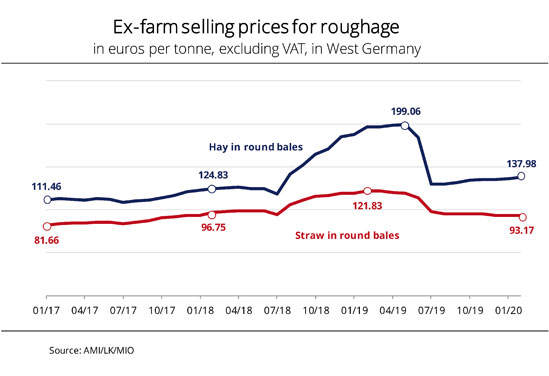Grain straw is scarce. Its manifold uses make grain straw a sought-after resource. Grain straw uses include the build-up of humus for climate protection and improvement of soil quality both in traditional and organic agriculture, structural feed, litter to meet increasing litter requirements, and expansion of crop rotation systems with leaf crops such as grain legumes. The use for biofuels production will have to take a back seat.
 For these reasons, the Union zur Förderung von Oel- und Proteinpflanzen e. V. (UFOP) has questioned the current political preference given to biofuels from residues wherever grain straw is involved as the feedstock source. UFOP has highlighted that grain straw is a commodity that is not to be had for nothing. In fact, grain straw is traded in the range of EUR 95 to EUR 120 per tonne. Prices are on an upward trend, especially when weather conditions do not allow for straw bailing or straw yields are low anyway. From UFOP’s point of view, grain straw is a soil structure improver that needs to go into the soil “carbon sink” to create stable humus. Also, UFOP has suggested that not enough attention is paid to production area requirements.
For these reasons, the Union zur Förderung von Oel- und Proteinpflanzen e. V. (UFOP) has questioned the current political preference given to biofuels from residues wherever grain straw is involved as the feedstock source. UFOP has highlighted that grain straw is a commodity that is not to be had for nothing. In fact, grain straw is traded in the range of EUR 95 to EUR 120 per tonne. Prices are on an upward trend, especially when weather conditions do not allow for straw bailing or straw yields are low anyway. From UFOP’s point of view, grain straw is a soil structure improver that needs to go into the soil “carbon sink” to create stable humus. Also, UFOP has suggested that not enough attention is paid to production area requirements.
The association has also challenged the alleged superiority of the greenhouse gas (GHG) balance of straw-based bioethanol over that of bioethanol from cultivated biomass. UFOP has argued that straw is a resource, and therefore expenses for production, fertilisers, fuel etc. should be allocated to the respective shares of grain and straw in accordance with international life cycle assessment (LCA) standards. According to UFOP, it is inappropriate to give preference to grain straw as a feedstock, since it has a GHG value of “0” g CO2/MJ. The association has underlined the need for adjustments in the RED II, which directive is to be reviewed in the wake of the European Green Deal.
UFOP also sees the need for adjustments as regards rapeseed oil-based biofuels, arguing that the protein component should be credited to the biofuel share. UFOP has complained that politics virtually ignores the option to use such crediting to safeguard a market for the crops used in EU biofuel production, such as rapeseed, grain, maize and sugar beet, and at the same time secure added value for agriculturists.
UFOP has called on the German government to create reliable framework conditions for biofuels from cultivated biomass that would obviously have to be based on requirements for sustainable crop production. Following the implementation of the RED, certification systems and procedures are now in place internationally to govern market access. These legally binding standards are stricter than the UN’s Sustainable Development Goals. They should also apply to biofuels from residues, the association has urged. UFOP expects that, due to the existing regulations, there will also be imports of residue-based biofuels from non-EU countries.
Source
Union zur Förderung von Oel- und Proteinpflanzen e. V. (UFOP), Chart of the week, 2020-02-17.
Supplier
Union zur Förderung von Oel- und Proteinpflanzen e.V. (UFOP)
Share
Renewable Carbon News – Daily Newsletter
Subscribe to our daily email newsletter – the world's leading newsletter on renewable materials and chemicals










